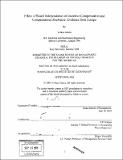Effect of board independence on incentive compensation and compensation disclosure : evidence from Europe
Author(s)
Muslu, Volkan
DownloadFull printable version (4.734Mb)
Other Contributors
Sloan School of Management.
Advisor
S.P. Kothari.
Terms of use
Metadata
Show full item recordAbstract
My thesis examines how the lack of board-of-director independence affects the structure and disclosure of executive compensation. I find that European companies with more insiders on their boards grant their executives more incentive compensation, after controlling for the level and economic determinants of executive compensation. This effect is more pronounced in countries with less protection for outside shareholders. The companies with more insiders on their boards also disclose more transparent information about executive compensation. Overall, my evidence supports the contracting hypothesis, in which capital market investors understand potential detrimental effects of insiders and drive companies to mitigate these effects through greater incentive compensation and improved compensation disclosure. The evidence is inconsistent with the opportunism hypothesis, in which risk-averse insiders grant themselves more fixed pay and disclose less transparent information about their compensation.
Description
Thesis (Ph. D.)--Massachusetts Institute of Technology, Sloan School of Management, 2005. Includes bibliographical references (leaves 39-42).
Date issued
2005Department
Sloan School of ManagementPublisher
Massachusetts Institute of Technology
Keywords
Sloan School of Management.